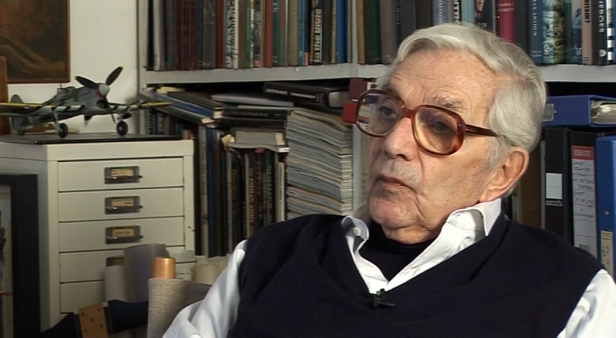NEXT STORY

Becoming the reluctant 'ship man'
RELATED STORIES

NEXT STORY

Becoming the reluctant 'ship man'
RELATED STORIES


|
Views | Duration | |
|---|---|---|---|
| 31. My first film: This Was a Woman | 154 | 02:35 | |
| 32. Learning art direction | 172 | 00:53 | |
| 33. My first big break: Captain Hornblower | 147 | 04:09 | |
| 34. Getting yellow jaundice | 124 | 03:48 | |
| 35. The first thing that went wrong | 113 | 04:00 | |
| 36. Bernard Voisin: the shipbuilder | 119 | 01:40 | |
| 37. Raoul Walsh: 'A tough guy' | 127 | 01:15 | |
| 38. Tom Morahan | 104 | 03:22 | |
| 39. The booming post-war smuggling trade | 117 | 02:50 | |
| 40. Becoming the reluctant 'ship man' | 109 | 04:18 |


To talk about Hornblower, I could probably entertain you for another two or three hours, because it was an incredible period.
It was a period shortly after the war, you know, and you had a lot of smuggling going on, and a lot of English ex-naval officers who bought these Fairmiles or Air Sea Rescue launches for very little money, and then went across to Algiers or somewhere that they thought… and used to buy cigarettes and take cigarettes, and so on. So Villefranche was... unbelievable. And I remember when the Royal Navy came in, and one of their senior officers had a brother who was having one of those boats; he couldn't... wouldn't go on the boat because his brother was a smuggler, you know. But in those days everything that was… American woman… and now that's come to me... Madame Ourillion, her name was, and she had one of those smuggling boats, and when somebody didn't want to do what she ordered him to do, she threw him overboard. At least, that was what they said, you know.
It was an unbelievable time in Villefranche, but I learnt a lot, I had a fabulous friend, who was Bernard, and family of… present at their children and grandchildren, and all that – actually, he was the best friend I... I think I've ever had – and also they took to Letitzia. They… first of all they said, 'Why do you have to get married to a Spaghetti when we have enough pretty girls in the South of France?' I said, 'Yes, I know', but then they all fell in love with her. And it was an incredible time, you know – there were people… Garbo was staying in Haut de Cagnes, and a lot of film people from the past…
And my supervisor was a man called Edmond Gréville, who was quite a well-known French director, but he didn't know the first thing about boats, or something. But he still had a job, he was paid by Jack Warner, and we used to go out a lot together and have fun.
Sir Kenneth Adam (1921-2016), OBE, born Klaus Hugo Adam, was a production designer famous for his set designs for the James Bond films of the 1960s and 1970s. Initially, he trained as an architect in London, but in October 1943, he became one of only two German-born fighter pilots to fly with the RAF in wartime. He joined 609 Squadron where he flew the Hawker Typhoon fighter bomber. After the war, he entered the film industry, initially as a draughtsman on This Was a Woman. His portfolio of work includes Barry Lyndon and The Madness of King George; he won an Oscar for both films. Having a close relationship with Stanley Kubrick, he also designed the set for the iconic war room in Dr Strangelove. Sir Ken Adam was knighted by Queen Elizabeth II in 2003.
Title: The booming post-war smuggling trade
Listeners: Christopher Sykes
Christopher Sykes is an independent documentary producer who has made a number of films about science and scientists for BBC TV, Channel Four, and PBS.
Tags: Captain Horatio Hornblower, WWII, Algiers, Villefranche-sur-Mer, Royal Navy, Cannes, Bernard Voisin, Greta Garbo, Edmond Gréville, Jack Warner
Duration: 2 minutes, 50 seconds
Date story recorded: December 2010 and January 2011
Date story went live: 14 September 2011